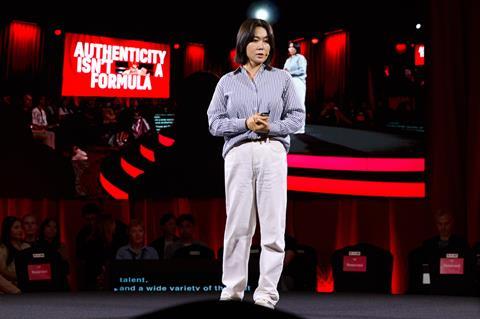Netflix is to launch a “first-of-its-kind” initiative in Australia that is designed to support neurodiverse people entering the industry. Speaki
Netflix is to launch a “first-of-its-kind” initiative in Australia that is designed to support neurodiverse people entering the industry.
Speaking at the Creative Asia Forum at Busan International Film Festival, Netflix executive Minyoung Kim said the Lumina initiative will “provide neurodiverse people a pathway to gain employment within the visual effects industry”.
Starting next week and launched in partnership with Bus Stop Films and Spectrum Films, those selected with gain training and on-set work placement on Netflix’s upcoming local production My Brilliant Career – a historical drama starring Philippa Northeast.
It expands on the streamer’s initiatives in the Asia-Pacific region, where Netflix has partnered with more than 250 local production outfits since beginning production there almost 10 years ago.
Kim, who is APAC VP of content (ex-India) at Netflix, also announced that the Creative Asia conference will next take place at the Jogja-NETPAC Asian Film Festival (JAFF) in Indonesia this December. The goal is to continue connecting emerging creators from across Southeast Asia with masterclasses, training and networking events.
According to the streamer, it reached 8,000 people across APAC with its skills and talent initiatives from 2021 to 2024, with hundreds more added this year.
“We’re committed to creating environments where creativity flourishes, where teams feel safe, respected, and inspired — because better working environments and healthier team cultures lead to higher-quality, more creative work,” said Kim.
Expanding initiatives
Ongoing initiatives include Reel Life, a programme in Southeast Asia, has been training emerging creatives for the past several years to raise skills in the local production industries.
In Japan next week, Netflix will host masterclasses and events at the Osaka Expo in a bid to empower emerging producers, directors, and screenwriters, especially those working outside of Tokyo.
In Taiwan, the streamer is hosting on-the-job training initiatives for emerging writers and production professionals, who will get the opportunity to work on Netflix Originals, in partnership with local partners Yiyi Pictures and the Taiwan Producers Association. These programs offer participants training and work experience for six months.
In South Korea, the fifth version of its VFX Academy has just wrapped. Kim said that Netflix has trained more than 330 VFX students over the past two and a half years in collaboration with Korean Academy of Film Arts (KAFA), with 70% of graduates already securing jobs with facilities such as Eyeline Studio, Westworld, VA Corp, Dexter and Gulliver Studio.
Intimacy coordinator
Kim was followed by Netflix’s APAC head of production Sung Q Lee, who led a panel in which Japanese intimacy coordinator Momoko Nishiyama discussed how the streamer first introduced the role to local productions in 2020. Since then, it has become an industry standard in the country.
“People on set feel safer, more empowered to speak up, and there’s much more open discussion,” she said. “Now, it’s okay to say no or to express what you’re comfortable with. It’s not just the actors and directors — staff are happier too, because they know what to prepare for in advance,” she says.”
Speaking at the forum, which Netflix launched in partnership with Busan last year, BIFF programme director Karen Park highlighted how perception of Asian productions globally has changed.
“Asian creativity has always been there — it just wasn’t being seen,” she said. “Now, thanks to global platforms and shifting attitudes, that’s finally changing. Talented filmmakers who once struggled to get funding and distribution now enjoy co-production opportunities and meet global audiences hanging on to every frame of their film.”
Park also credited Netflix for the part it has played in breaking down language and cultural barriers. “Now that everyone is watching Squid Game, subtitles aren’t scary anymore,” she added. “What’s powerful is that this isn’t just about consumption — it’s about respect. People are starting to see Asian stories as complex, emotional, not ‘oriental’, not ‘exotic’, but universal human stories.”

COMMENTS